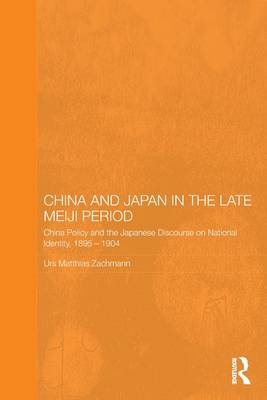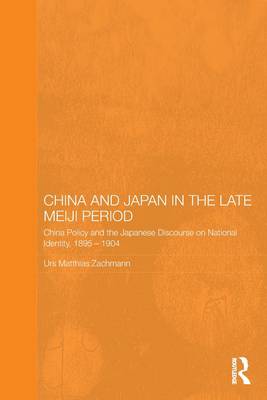
- Retrait gratuit dans votre magasin Club
- 7.000.000 titres dans notre catalogue
- Payer en toute sécurité
- Toujours un magasin près de chez vous
- Retrait gratuit dans votre magasin Club
- 7.000.0000 titres dans notre catalogue
- Payer en toute sécurité
- Toujours un magasin près de chez vous
China and Japan in the Late Meiji Period
China Policy and the Japanese Discourse on National Identity, 1895-1904
Urs Matthias ZachmannDescription
The first war between China and Japan in 1894/95 was one of the most fateful events, not only in modern Japanese and Chinese history, but in international history as well. The war and subsequent events catapulted Japan on its trajectory toward temporary hegemony in East Asia, whereas China entered a long period of domestic unrest and foreign intervention. Repercussions of these developments can be still felt, especially in the mutual perceptions of Chinese and Japanese people today. However, despite considerable scholarship on Sino-Japanese relations, the perplexing question remains how the Japanese attitude exactly changed after the triumphant victory in 1895 over its former role model and competitor.
This book examines the transformation of Japan's attitude toward China up to the time of the Russo-Japanese War (1904/5), when the psychological framework within which future Chinese-Japanese relations worked reached its erstwhile completion. It shows the transformation process through a close reading of sources, a large number of which is introduced to the scholarly discussion for the first time. Zachmann demonstrates how modern Sino-Japanese attitudes were shaped by a multitude of factors, domestic and international, and, in turn, informed Japan's course in international politics.
Winner of the JaDe Prize 2010 awarded by the German Foundation for the Promotion of Japanese-German Culture and Science Relations
Spécifications
Parties prenantes
- Auteur(s) :
- Editeur:
Contenu
- Nombre de pages :
- 256
- Langue:
- Anglais
- Collection :
Caractéristiques
- EAN:
- 9780415608398
- Date de parution :
- 07-02-11
- Format:
- Livre broché
- Format numérique:
- Trade paperback (VS)
- Dimensions :
- 156 mm x 234 mm
- Poids :
- 362 g

Les avis
Nous publions uniquement les avis qui respectent les conditions requises. Consultez nos conditions pour les avis.






